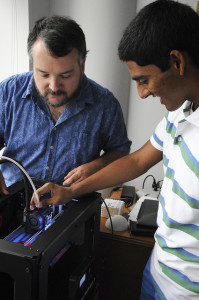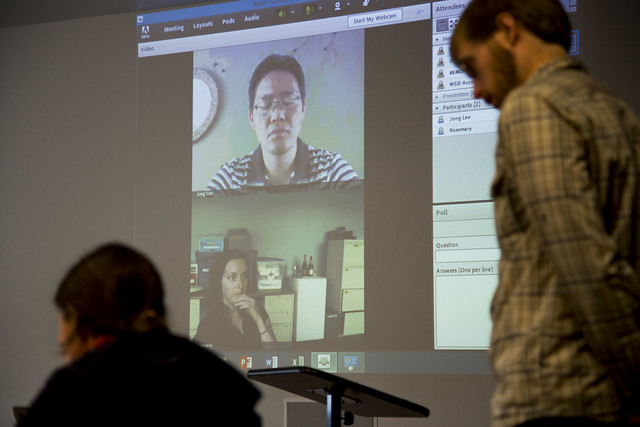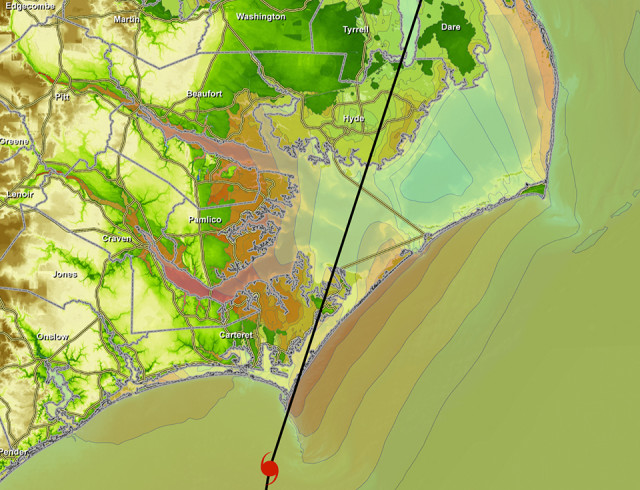DENVER, Nov. 13, 2013 – The Data Intensive Cyber Environments (DICE) Group at the University of North Carolina (UNC) at Chapel Hill and the University of California at San Diego (UCSD), and RENCI, (UNC-Chapel Hill’s Renaissance Computing Institute), announced today a plan to merge the two main branches of the iRODS (integrated Rule-Oriented Data System) data management platform into a single, sustainable and production-oriented product. Read more
REACH NC selected as top university-based economic development initiative
 The University Economic Development Association (UEDA) announced its 2013 Awards of Excellence winners during its Annual Summit held Oct. 29 in Pittsburgh. The awards recognize UEDA members who are transforming their campuses into engines of economic prosperity through initiatives in five categories: 1) community connected campus; 2) research and analysis; 3) leadership and collaboration; 4) innovation and entrepreneurship; and 5) talent development.
The University Economic Development Association (UEDA) announced its 2013 Awards of Excellence winners during its Annual Summit held Oct. 29 in Pittsburgh. The awards recognize UEDA members who are transforming their campuses into engines of economic prosperity through initiatives in five categories: 1) community connected campus; 2) research and analysis; 3) leadership and collaboration; 4) innovation and entrepreneurship; and 5) talent development.
Gleaning data from a virtual world
RENCI and Duke researchers aim to understand whether VEs can help patients control diabetes

The pharmacy in the virtual environment created by Duke School of Nursing Researchers. The pharmacy allowed study participants to look up health information and information about medications.
Rates of type 2 diabetes are increasing, and the debilitating disease touches the lives of more and more people each day. Although genetic factors do play a role in the chance of an individual developing this chronic condition, lifestyle choices such as diet and exercise, also play crucial roles in both the risk of contracting type 2 diabetes, and managing and controlling it throughout an individual’s life. Read more
NOAA funding will help RENCI continue development of surge forecasting system
CHAPEL HILL, NC – The state of North Carolina is the third most susceptible to hurricane and tropical storm damage, with only Florida and Louisiana taking more hits from hurricanes in the history of weather tracking. In recent years, RENCI has contributed to the never-ending task of protecting the North Carolina coastline from potential damage by developing cyberinfrastructure and software to construct models of wave surge from large-scale storms. Read more
UNC partners with NIH to explore genomic testing for newborns
UNC School of Medicine project will use RENCI-developed analytics framework.
 CHAPEL HILL, N.C. – As the clinical use of genomic testing expands, the practical and ethical considerations of using the technology to screen newborns for genetic conditions will be the focus of a new study undertaken at the University of North Carolina.
CHAPEL HILL, N.C. – As the clinical use of genomic testing expands, the practical and ethical considerations of using the technology to screen newborns for genetic conditions will be the focus of a new study undertaken at the University of North Carolina.
Researchers at UNC plan to sequence the entire genome of 400 infants to determine what useful clinical data can be acquired through the tests. In conjunction with the testing, the UNC team has partnered with Research Triangle Park-based RTI International to develop educational and consent tools to determine how best to educate parents and physicians about the test and its results.
RENCI helps visualize National Geographic feature story on rising seas
To create an interactive image to demonstrate the effects of major tropical storms and storm surge in the future, National Geographic magazine turned to RENCI for assistance. Senior Research Scientist Brian Blanton helped the magazine staff interpret data they received from NOAA and the Army Corps of Engineers on what Manhattan would look like if a storm the size of Hurricane Sandy hit in 100 years, when sea level could be as much five feet higher than it is now. The info graphic, which appeared online and in a center spread in the print magazine, uses data from the Sea, Lake and Overland Surges from Hurricanes (SLOSH) modeling program, which was developed by the National Weather Service to estimate surge heights.
RENCI helps youth of today build technology of tomorrow
 Fuel emissions from motors in cars, motorcycles, even lawnmowers and chainsaws, are one of the greatest contributors to climate change. Using the technology and expert assistance of UNC’s Renaissance Computing Institute (RENCI), a research institution that develops advanced technologies to enable research and innovation, Rishi Rajagopalan, is trying to tackle this environmental problem.
Fuel emissions from motors in cars, motorcycles, even lawnmowers and chainsaws, are one of the greatest contributors to climate change. Using the technology and expert assistance of UNC’s Renaissance Computing Institute (RENCI), a research institution that develops advanced technologies to enable research and innovation, Rishi Rajagopalan, is trying to tackle this environmental problem.
As a project for his academic independent study last spring, Rajagopalan, a rising senior at Jordan High School in Durham, designed a compressed air engine that requires only pressurized air to turn the crankshaft that allows it to run. The two-cylinder engine could be used to power dirt bikes, lawn mowers, and other small, motorized devices, and Rajagopalan said a larger model could eventually be built to power automobiles. Read more
UNC, RENCI tool provides innovative ways to share humanities data

Screen shot of the DH Press project “Mapping the Long Women’s Movement.” Each dot represents a short audio clip; the color of the dots show what the clip is about and their placement on the map indicate where the event occurred.
CHAPEL HILL, August 13, 2013 – A new software tool developed by the UNC-Chapel Hill Digital Innovation Lab (DIL) in collaboration with RENCI (UNC’s Renaissance Computing Institute) helps researchers, teachers, and community groups document history and community projects with an easy-to-use tool that builds interactive websites.
The Digital Humanities Toolkit, or DH Press, is built on the open source WordPress platform. Users can combine and visualize a variety of digitized humanities-related material to create a range of digital projects, from virtual walking tours and interactive exhibits, to classroom teaching tools and community repositories. The content can be easily organized and managed, as well as migrated in and out of the system to other DH Press projects or to other databases. This makes the toolkit ideal for presenting and sharing humanities-related data.
A techie marathon: RENCI hosts “Hackathon” to improve water science software

Chapel Hill, NC- Serious brain muscles were flexed at the software developers’ version of the Olympics—a “hackathon,” held at RENCI Europa Center, to work towards a collaborative goal of improving water modeling software important for future water scientists and researchers.
ESIP Federation meeting highlights data practices related to disaster management
July 16, 2013 —The Federation of Earth Science Information Partners (ESIP Federation) met in Chapel Hill, North Carolina to advance the work of its data practitioner community. Hosted by RENCI, the meeting focused on bringing together communities to improve Earth science data management practices and coordinate efforts to make data more discoverable, accessible and useful to many. Read more




